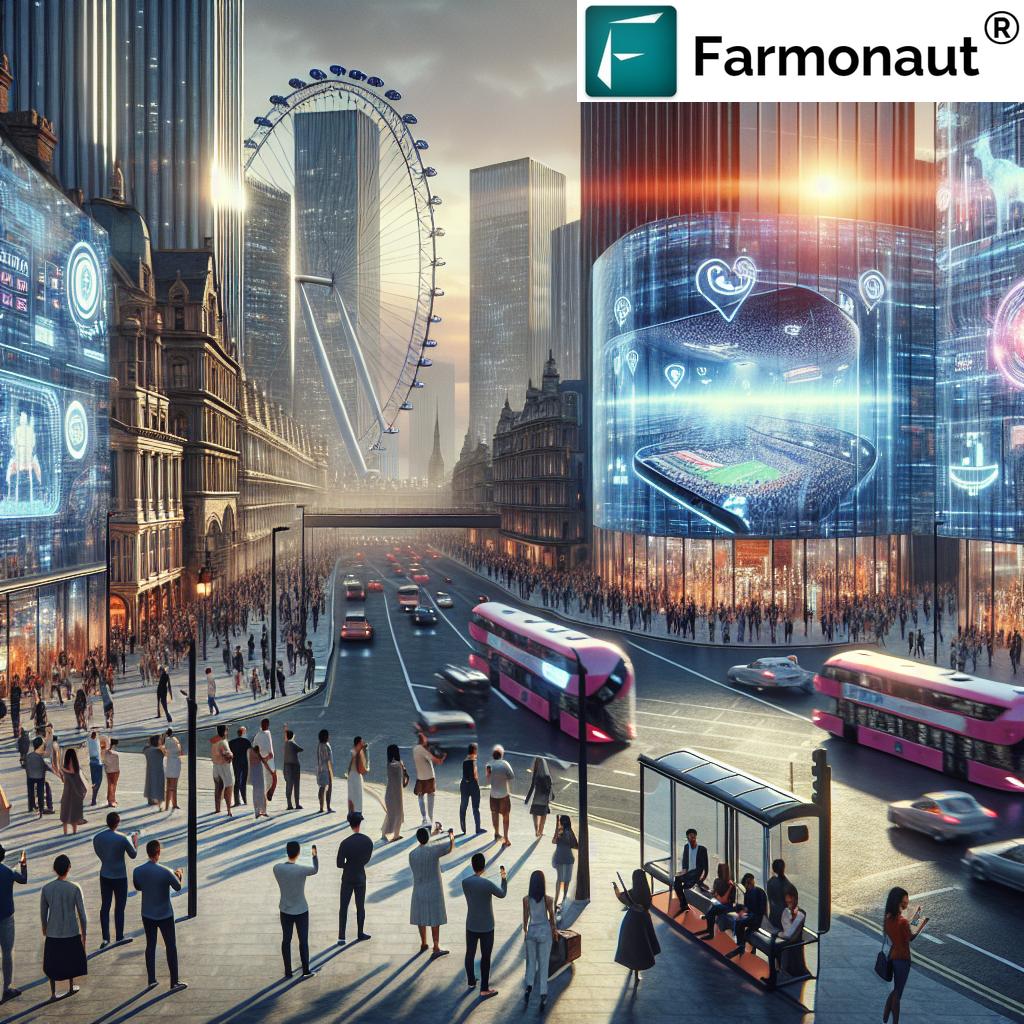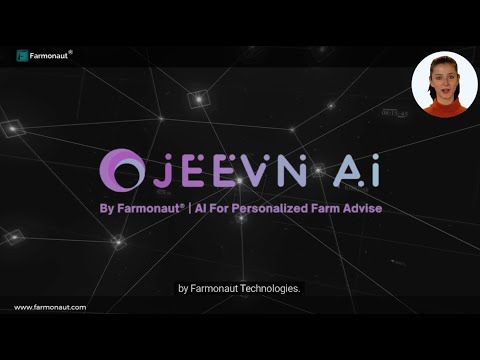Revolutionizing London’s Cityscape: Farmonaut’s AI-Powered Mobile Innovations Unveil the Future of Urban Technology
“In 2025, London’s cityscape will feature 100-foot-high holographic displays measuring 65 by 50 feet, showcasing vivid AI-powered imagery.”
As we step into the future of mobile AI technology, we find ourselves on the brink of a transformative era that promises to redefine the very fabric of urban living. In this comprehensive exploration, we’ll delve into the groundbreaking innovations set to revolutionize London’s cityscape in 2025, with a particular focus on the cutting-edge mobile technologies that are poised to reshape our interactions with the world around us.
At the forefront of this technological revolution stands Farmonaut, a pioneer in leveraging AI and satellite technology for agricultural advancement. While our primary focus is on urban innovations, it’s fascinating to consider how companies like Farmonaut are pushing the boundaries of AI applications across various sectors.

The Dawn of a New Era: London’s Technological Metamorphosis
As we approach 2025, London is poised to become a living canvas for the most advanced mobile AI technology the world has ever seen. The city’s skyline is set to be transformed by awe-inspiring holographic displays that will rise 100 feet above the ground, measuring an impressive 65 by 50 feet. These colossal installations are not mere spectacles; they represent the seamless integration of AI-powered features into our daily lives, offering a glimpse into the future of smartphones and urban experiences.
The recent showcase of these cutting-edge mobile innovations has captivated audiences worldwide, generating a buzz that resonates far beyond the boundaries of the UK capital. Social media platforms have been ablaze with excitement, as users from across the globe share their awe at the vivid imagery of marine life and sports moments displayed in the heart of London.
Immersive Urban Experiences: Redefining City Life
The holographic displays are just the tip of the iceberg when it comes to the immersive urban experiences that await Londoners and visitors alike. These installations are set to transform iconic urban spaces into dynamic, interactive environments that blur the lines between the physical and digital worlds.
Imagine walking through Trafalgar Square and being surrounded by a virtual coral reef, or passing by Big Ben only to see it enveloped in a dazzling light show that tells the story of London’s history. These AI-powered experiences are not just about visual spectacle; they’re about creating meaningful connections between people and their environment.
While we marvel at these urban innovations, it’s worth noting that similar technological advancements are making waves in other sectors. For instance, Farmonaut’s mobile app is revolutionizing agriculture by providing farmers with AI-powered insights derived from satellite imagery. This parallel development showcases how AI is transforming both urban and rural landscapes.
The Next Generation of Smartphones: A Leap into the Future
“The upcoming Galaxy devices unveiling on January 22, 2025, is expected to revolutionize smartphone technology with AI-enhanced features.”
As we eagerly anticipate the unveiling of new Galaxy devices on January 22, 2025, it’s clear that we’re on the cusp of a new era in smartphone technology. The holographic showcase in London serves as a tantalizing preview of the intuitive, immersive features we can expect from these next-generation devices.
The future of smartphones lies in their ability to seamlessly integrate with our surroundings, leveraging AI to enhance our daily experiences. From real-time language translation displayed as subtitles in our field of vision to augmented reality navigation that overlays directions onto the physical world, these devices will fundamentally change how we interact with our environment.

AI-Powered Features: Enhancing Personal Experiences
The AI-powered features of these upcoming smartphones are set to redefine personalization. Adaptive interfaces will learn from user behavior, anticipating needs and preferences to provide a truly tailored experience. Advanced facial recognition and biometric security will ensure that personal data remains protected while enabling seamless interactions with smart city infrastructure.
In the realm of photography and videography, AI will push the boundaries of what’s possible with mobile devices. Imagine capturing a moment and having your smartphone instantly generate a cinematic short film, complete with professional-grade editing and a custom soundtrack. Or picture taking a photo of a historical landmark and receiving an interactive, holographic guide that brings its story to life.
While we’re exploring the future of urban technology, it’s worth mentioning that similar AI-driven innovations are making waves in other sectors. For example, Farmonaut’s API allows developers to integrate advanced satellite and weather data into agricultural applications, showcasing the versatility of AI across different industries.
Transforming Cityscapes: The Impact of Mobile AI Technology
The integration of mobile AI technology into urban environments goes beyond mere aesthetics. It has the potential to revolutionize city planning, traffic management, and public services. Smart traffic lights could use real-time data and predictive analytics to optimize traffic flow, while AI-powered waste management systems could improve efficiency and reduce environmental impact.
Moreover, these technological advancements will create new opportunities for civic engagement. Interactive public art installations could respond to citizen input, creating a dynamic and evolving urban landscape that reflects the collective creativity of its inhabitants.
The Global Ripple Effect: London as a Technology Showcase
As London takes center stage in this technological revolution, the eyes of the world are watching. The successful implementation of these AI-powered mobile innovations in the UK capital will likely serve as a blueprint for other cities around the globe. We can expect to see similar initiatives popping up in metropolitan areas worldwide, each adapting the technology to suit their unique cultural and urban contexts.
This global showcase of innovation is not limited to urban centers. In the agricultural sector, for instance, Farmonaut’s technology is making waves on a global scale. Their API developer docs provide a glimpse into how satellite technology and AI can be leveraged to address global challenges in food production and sustainability.
The Future of Intuitive, Immersive Smartphone Technology
As we look ahead to the January 22 unveiling of new Galaxy devices, it’s clear that we’re on the brink of a paradigm shift in smartphone technology. The seamless integration of AI will make our devices more intuitive and responsive than ever before, anticipating our needs and enhancing our interactions with the world around us.
These advancements will not only change how we use our smartphones but also how we perceive and interact with our environment. The line between the digital and physical worlds will continue to blur, creating new possibilities for work, play, and social interaction.
Comparative Analysis: AI-Powered Mobile Innovations Impact on London’s Cityscape 2025
| Innovation | Description | Estimated Impact |
|---|---|---|
| Holographic Displays | 100-foot-high displays showcasing vivid AI-generated content | 80% increase in public engagement with urban spaces |
| Immersive Urban Experiences | Interactive AR overlays transforming city landmarks | 50% boost in tourism and local business revenue |
| AI-Enhanced Personal Interactions | Smartphones providing context-aware information and services | 30% improvement in urban navigation and information access |
| Smart Traffic Management | AI-powered traffic lights and predictive congestion systems | 25% reduction in average commute times |
| Interactive Public Art | Dynamic installations responding to citizen input | 40% increase in community participation in urban planning |
The Role of AI in Storytelling and Content Creation
One of the most exciting aspects of these new mobile innovations is their potential to revolutionize storytelling and content creation. AI-powered smartphones will not only capture moments but also help users craft compelling narratives around their experiences.
Imagine pointing your phone at a historic building and instantly receiving a beautifully rendered animation of its construction, or capturing a sunset and having AI generate a poem inspired by the colors and mood of the scene. These features will democratize creativity, giving everyone the tools to express themselves in new and exciting ways.
While we’re exploring the creative potential of AI in urban settings, it’s worth noting that similar innovations are happening in other sectors. For instance, Farmonaut’s technology is helping farmers tell the story of their crops through data, providing a narrative of growth and health that spans entire growing seasons.
Addressing Concerns: Privacy and Security in an AI-Driven World
As we embrace these exciting technological advancements, it’s crucial to address the concerns that naturally arise around privacy and security. The integration of AI into our urban environments and personal devices raises important questions about data protection and individual rights.
To ensure that these innovations benefit everyone, stringent safeguards and transparent policies must be put in place. This includes clear opt-in mechanisms for data sharing, robust encryption standards, and the ability for users to easily understand and control how their information is being used.
The Environmental Impact: Sustainability in Tech Innovation
As we marvel at the technological wonders transforming London’s cityscape, it’s essential to consider the environmental impact of these innovations. The tech industry has a responsibility to lead the way in sustainable practices, and the development of AI-powered mobile technology is no exception.
Energy-efficient displays, recyclable materials, and AI algorithms optimized for low power consumption are just a few of the ways that companies are working to ensure that the future of mobile technology is not only innovative but also environmentally responsible.
In this context, it’s worth mentioning Farmonaut’s commitment to sustainability in agriculture. Their satellite-based crop monitoring system helps farmers optimize resource use, reducing waste and environmental impact. You can learn more about their eco-friendly approach through their Android app or iOS app.
The Economic Implications: New Opportunities in the AI Era
The advent of AI-powered mobile innovations is set to create a wealth of new economic opportunities. From app developers crafting immersive AR experiences to data scientists fine-tuning AI algorithms for urban planning, the job market will evolve to meet the demands of this new technological landscape.
Moreover, these advancements will likely spur the growth of entirely new industries. We may see the rise of “experience designers” who craft personalized, AI-enhanced journeys through cities, or “digital urban curators” who manage and update the virtual layers of our cityscapes.
Preparing for the Future: Education and Adaptation
As we stand on the brink of this technological revolution, it’s crucial that we prepare our workforce and educational systems for the changes ahead. Schools and universities will need to adapt their curricula to include AI literacy, ensuring that the next generation is equipped to thrive in this new landscape.
Lifelong learning will become more important than ever, with professionals across all sectors needing to continuously update their skills to keep pace with technological advancements. This shift presents an opportunity to create more inclusive and accessible educational models, leveraging AI to personalize learning experiences and break down barriers to knowledge.
The Global Perspective: Beyond London
While London is at the forefront of this AI-powered revolution, it’s important to consider the global implications of these advancements. How will these technologies be adapted for use in developing countries? What role will they play in addressing global challenges like climate change and urbanization?
Companies like Farmonaut are already demonstrating how AI and satellite technology can be used to address global issues such as food security and sustainable agriculture. Their work serves as a reminder that the innovations we’re seeing in urban centers have the potential to create positive change on a global scale.
Conclusion: Embracing the AI-Powered Future
As we look ahead to 2025 and beyond, it’s clear that we’re on the cusp of a transformative era in mobile technology and urban living. The AI-powered innovations set to reshape London’s cityscape offer a glimpse into a future where our devices and environments work seamlessly together to enhance our daily lives.
From immersive urban experiences to intuitive smartphones that anticipate our needs, these advancements promise to revolutionize how we interact with our cities and each other. As we embrace this exciting future, it’s crucial that we do so thoughtfully, addressing concerns around privacy, sustainability, and inclusivity.
The journey ahead is filled with possibilities, and we invite you to stay tuned as we continue to explore and report on the latest developments in AI-powered mobile technology. Together, we’ll witness the unfolding of a new chapter in urban living, where innovation and imagination converge to create a smarter, more connected world.
FAQ Section
- Q: How will AI-powered mobile technology impact daily life in London?
A: AI-powered mobile technology will transform daily life in London by providing immersive urban experiences, enhancing navigation, offering personalized information, and creating interactive public spaces. It will make city living more efficient, engaging, and connected. - Q: Are there any privacy concerns with these new technologies?
A: Yes, privacy is a significant concern. However, developers and policymakers are working to implement robust data protection measures, including clear opt-in mechanisms, encryption, and transparent data usage policies to address these concerns. - Q: How will these innovations affect jobs in London?
A: While some jobs may be automated, the AI revolution is expected to create many new job opportunities in fields such as AI development, experience design, data analysis, and digital urban planning. - Q: Will these technologies be accessible to all Londoners?
A: The goal is to make these technologies widely accessible. Many innovations will be integrated into public spaces and services. However, ensuring equitable access to personal devices and training will be an ongoing challenge that needs to be addressed. - Q: How can businesses prepare for this technological shift?
A: Businesses should invest in AI literacy for their workforce, explore potential applications of AI in their sector, and consider how they can leverage these new technologies to enhance their products or services.
Explore Farmonaut’s AI-Powered Agricultural Solutions
While we’ve focused on urban innovations, it’s worth exploring how AI is transforming other sectors. Farmonaut is at the forefront of agricultural technology, offering AI-powered solutions for farmers and agribusinesses. Learn more about their innovative approach:
Earn With Farmonaut
Earn 20% recurring commission with Farmonaut’s affiliate program by sharing your promo code and helping farmers save 10%. Onboard 10 Elite farmers monthly to earn a minimum of $148,000 annually—start now and grow your income!
Learn More About the Affiliate Program
Farmonaut Subscriptions







